College Sports
Benjamin Houlihan named recipient of Dr. Richard Wittmann Award
Each academic year, the Benedictine Men’s Soccer program names a recipient of the Dr. Richard Wittmann Award. This year’s recipient is senior Benjamin Houlihan. The award is named after one of the founding fathers of Benedictine Soccer. Dr. Wittmann. Wittmann served as the first men’s soccer club coach from 1959-1962 before the program became an […]
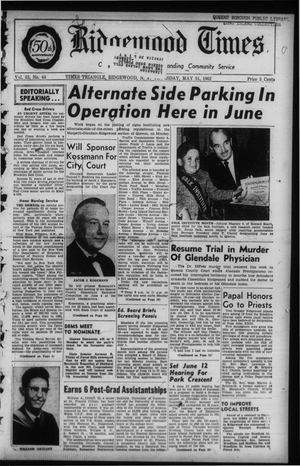


Each academic year, the Benedictine Men’s Soccer program names a recipient of the Dr. Richard Wittmann Award. This year’s recipient is senior Benjamin Houlihan.
The award is named after one of the founding fathers of Benedictine Soccer. Dr. Wittmann. Wittmann served as the first men’s soccer club coach from 1959-1962 before the program became an intercollegiate sport in 1963.
Houlihan, a defender and Mechanical Engineering major, will graduate on Saturday and plans to attend the Seminary after graduation. He has earned this year’s Wittmann Award based on criteria established by the men’s soccer program, encompassing the program’s and Benedictine’s core values.
“Ben has showcased tremendous growth with his time on the Men’s Soccer program,” said head coach John Sosa. “Ben joined as a walk-on player in his junior year after focusing on his academics his first two years at Benedictine.
Through hard work and perseverance, Ben worked his way up the roster. He managed to become an important defender on the field for the program, starting a total of 14 games.
“Whenever Ben steps on the field, he gives his utmost best effort and always puts the team first,” Coach Sosa said. “Ben has been a great example for his teammates, showing that hard work, dedication, and a positive attitude can lead to huge growth and results.”
Houlihan has maintained above a 3.0 GPA while balancing engineering, soccer, a strong faith life, and an active social life on campus. Ben always has a smile on his face and is brings others up with his positivity and humor. Each person on the team will tell you that Ben is a wonderful person to be around and has had a positive impact on everyone he meets. Ben exemplifies what it means to be a Benedictine College Men’s Soccer player.
www.ravenathletics.com | #UnleashGreatness | www.benedictine.edu
College Sports
Men’s Golf, Coldstream Country Club Renew Contract
David Cohen Director / Strategic Brand Engagement Story Links CINCINNATI – The Cincinnati men’s golf program and its friendly Coldstream Country Club home have extended their relationship. “I am beyond thrilled to reach an extension with Coldstream Country Club,” head coach Doug Martin said. “It is a top-class, championship venue that tests […]
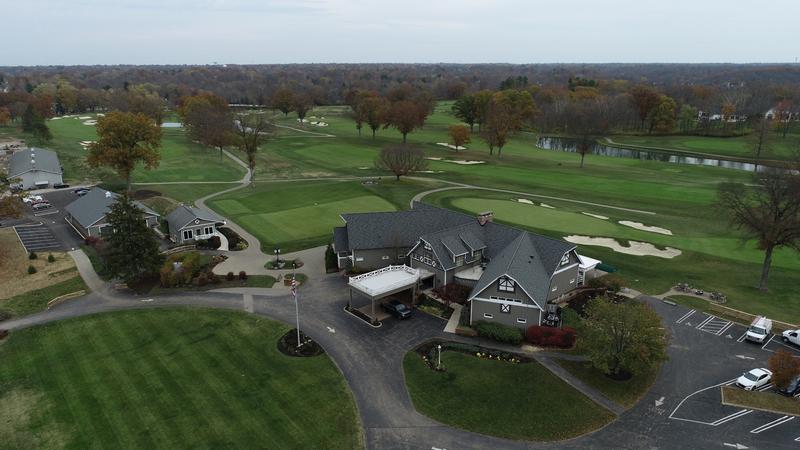

David Cohen
Director / Strategic Brand Engagement
CINCINNATI – The Cincinnati men’s golf program and its friendly Coldstream Country Club home have extended their relationship.
“I am beyond thrilled to reach an extension with Coldstream Country Club,” head coach Doug Martin said. “It is a top-class, championship venue that tests our players to be their very best day in and day out. Their facilities, membership, and staff are some of the best I have ever been around in golf. The Bearcat Invitational, also hosted at Coldstream every year, is an event that has become known as one of the best in college golf. We are proud to call Coldstream Country Club our home.”
Built in 1959, Coldstream is a Dick Wilson design often regarded as one of his finest works. Keith Foster completed a critically-acclaimed renovation of the golf course in 2021.
“On behalf of the Coldstream Board of Trustees, we look forward to continuing this partnership and hosting one of the premier caliber collegiate events throughout the country,” Shawn Costello, Coldstream General Manager and Chief Operating Officer, said.
Coldstream has hosted many championships over the years, including Ohio Golf Association and Greater Cincinnati Golf Association championships, as well as being the host of the Bearcat Invitational at Coldstream since 2019.
“Coldstream is very excited to extend its relationship with The University of Cincinnati Men’s Golf Program” said Bill Williamson, the club’s former Board member and Secretary. “Coldstream is the premier golf course in the region and being able to showcase the facility with Coach Martin and the program at UC is consistent with the membership’s commitment to championship golf and competition.”
Cincinnati has hosted its annual fall Bearcat Invitational at Coldstream each year since 2016, with the only exception being in 2020 due to COVID and 2021 for the renovation.
The program has experienced some outstanding success over that stretch as well. Individually, Austin Squires qualified for the NCAA Regionals in 2017 and 2019, as did Sam Jean in 2022, Ty Gingerich in 2024 (Big 12 champion that year) and Ryan Ford in 2025. The team earned its first NCAA bid in 2023.
College Sports
Women’s Soccer Announces Seven-Member Class of 2029
Story Links CAMBRIDGE, Mass. – Harvard University women’s soccer will welcome seven first-years to the program for the start of the 2025 season as part of the Class of 2029, Chris Hamblin, The Branca Family Head Coach for Harvard Women’s Soccer, announced on Friday. “We are very excited to welcome our […]
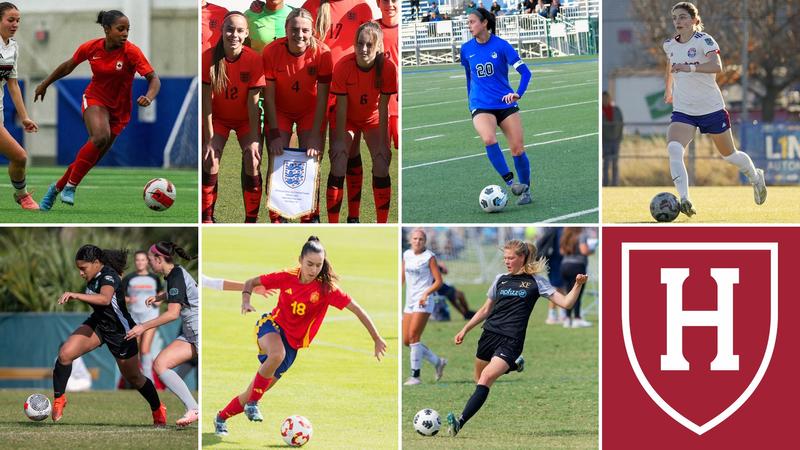
CAMBRIDGE, Mass. – Harvard University women’s soccer will welcome seven first-years to the program for the start of the 2025 season as part of the Class of 2029, Chris Hamblin, The Branca Family Head Coach for Harvard Women’s Soccer, announced on Friday.
“We are very excited to welcome our incoming class to Harvard this fall,” Hamblin said. “This talented group of student-athletes brings high level soccer experience to our program and are a great fit for our locker room and the Harvard community. I would like to thank Mike Calise and Mark McDevitt for going above and beyond to identify and recruit the Class of 2029. We are all looking forward to seeing this group play with the team this fall and make an impact on and off the field.”
The group includes one student-athlete each from the U.S. states of California, Massachusetts, Virginia, and Washington alongside international student-athletes from Canada, England, and Spain. The class features three midfielders, two forwards, and two defenders who have competed at top clubs in their respective regions.
Harvard’s Class of 2029 includes forward Kennedy Belfon (Whitby, Ontario), defender Phoebe Chadwick (Stoke-on-Trent, England), midfielder Hannah Eftekhari (San Diego, Calif.), defender Danicka Miller (Arlington, Va.), forward Kendra Santiago (New Bedford, Mass.), midfielder Elsa Santos López (Valdemoro, Spain), and midfielder Caroline Studebaker (Fall City, Wash.).
Kennedy Belfon
Forward | 5-foot-4 | Whitby, Ontario | All Saints Catholic Secondary School
- Member of the Canadian National Development Training Center
- Competed for Team Ontario in the U16 and U17 Provincial Selection Games
- Played for the Florida Premier Football Club ECNL and Markham SC
- Won a provincial championship with Markham SC
- Set a provincial record in the 4x100m relay
Phoebe Chadwick
Defender | 5-foot-7 | Stoke-on-Trent, England | Blythe Bridge School
- Captain of the England U16 National Team
- Earned her first cap against Wales
- Manchester United U21
- Won a National League Title in 2024
- Participated in Manchester United’s first team training camp and debuted in a friendly against PSV Eindhoven
- Debuted for Stoke City’s U16 team at the age of 13
Hannah Eftekhari
Midfielder | 5-foot-7 | San Diego, Calif. | La Jolla Country Day School
- Member of the San Diego Surf ECNL
- Member of the U.S. Youth National Futsal Team
- Earned ECNL First Team All-Conference Honors
- Pacific League Player of the Year
- Team Captain
- First Team All-Coastal League
Danicka Miller
Defender | 5-foot-7 | Arlington, Va. | Washington-Liberty High School
- Member of the Arlingston Soccer Club ECNL
- Rated the No. 45 defender in the country by Top Drawer Soccer
- Ranked in the IMG Academy Top 200 recruits
- Selected to the 2024 ECNL Conference Cup and Selection Game
- Earned ECNL First Team All-Conference in 2022-23 and ECNL Second Team All Conference in 2023-24
- 2024 First Team Washington Post All-Met Team
Kendra Santiago
Forward | 5-foot-6 | New Bedford, Mass. | Greater New Bedford Regional Vocational Technical High School
- Member of the Scorpions Soccer Club ECNL
- 2024 Southcoast Girls Soccer Player of the Year
- Southcoast All-Star and Super Team Honors
- Team Captain
- Massachusets All-State
- Graduated as GNB Voc-Tech’s Valedictorian
Elsa Santos López
Midfielder | 5-foot-7 | Valdemoro, Spain | Valle del Miro
- Member of the U15-U19 Spanish National Team
- Made debut with Real Madrid’s First Team in 2024 at the age of 17 against Sevilla
- 2025 Champions League Quarterfinalist; ousted by eventual Champion Arsenal
- Won a Copa de la Reina Youth Title in 2024
- Won two league titles and posted an undeafeated season with the Real Madrid U19s
- Debuted with Real Madrid’s Second Team at the age of 15
Caroline Studebaker
Midfielder | 5-foot-10 | Fall City, Wash. | The Bear Creek School
- Member of the Crossfire Soccer Club ECNL
- Selected to the ECNL Selection Game
- Earned ECNL First Team All-Conference Honors
- Invited to the U.S. Youth National Team Talent Identification Centers
- Won the 2024 USL W League Northwest Championship
- Reached the USL W League Western Conference Finals in 2024
College Sports
Bochen Joins Vimmerby HC in Sweden’s HockeyAllsvenskan
Story Links WALTHAM, Mass. – Two-time All-Atlantic Hockey defenseman Nick Bochen has signed with Vimmerby HC in Sweden’s second division, HockeyAllsvenskan. Bochen was a first team All-Atlantic Hockey selection for Bentley this past season and was a finalist for the AHA’s Best Defenseman award. He had six points in Bentley’s postseason […]
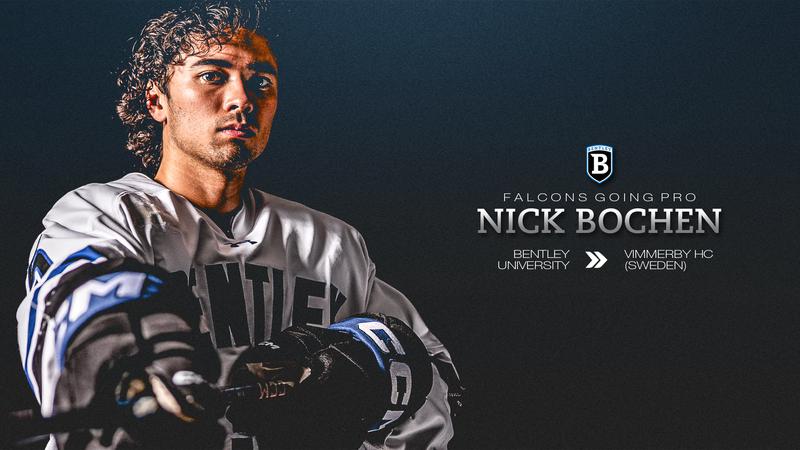
WALTHAM, Mass. – Two-time All-Atlantic Hockey defenseman Nick Bochen has signed with Vimmerby HC in Sweden’s second division, HockeyAllsvenskan.
Bochen was a first team All-Atlantic Hockey selection for Bentley this past season and was a finalist for the AHA’s Best Defenseman award.
He had six points in Bentley’s postseason run, including one goal and one assist in the championship game win over Holy Cross. He was named to the All-Tournament team.
On the season, Bochen had nine goals, 21 assists and was second on the team with 30 points.
In three seasons in Waltham, he tallied 20 goals and 54 assists in 109 games.
Vimmerby is in the southeast of Sweden, about 190 miles south of the capital Stockholm.
Bochen earned his master’s degree from Bentley in business analytics.
College Sports
NEHC All-Academic Team honors for all 21 eligible Thoroughbreds
Story Links 2024-25 NEHC ALL-ACADEMIC TEAM MARSHFIELD, Mass. – The New England Hockey Conference (NEHC) announced the All-Academic Team recipients for the 2024-25 academic year. All 21 eligible Skidmore student-athletes earned the award. To be eligible for All-Academic recognition a student must carry […]
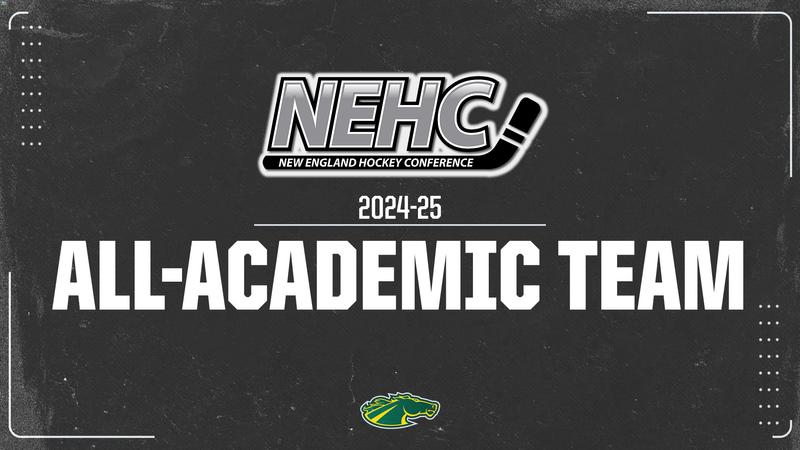
MARSHFIELD, Mass. – The New England Hockey Conference (NEHC) announced the All-Academic Team recipients for the 2024-25 academic year. All 21 eligible Skidmore student-athletes earned the award.
To be eligible for All-Academic recognition a student must carry a minimum of a 3.0 cumulative GPA for over the academic year and have completed one full year at their current institution by the beginning of the hockey season. Student-athletes that were freshmen or first-years transfer during the 2024-25 season were not eligible.
All 11 NEHC institutions were represented in the final installment of the list, with 207 student-athletes in total earning the honors. New England College, Norwich University, Salve Regina University led the way with 22 honorees each. Skidmore was close behind with 21 and 100% of its eligible student-athletes honored.
| Alex Bonrouhi | Marina Del Ray, CA | Sophomore | Management and Business/Economics | Skidmore College |
| Will Dow-Kenny | Abbotsford, BC | Senior | Neuroscience | Skidmore College |
| Mitchell Floccare | Buffalo, NY | Sophomore | Management and Business/Economics | Skidmore College |
| Matthew Franzoi | Oakville, ON | Junior | Management and Business/Economics | Skidmore College |
| Zach Frisk | Long Beach Township, NJ | Senior | Management and Business | Skidmore College |
| Ethan Heidepriem | Findlay, OH | Senior | Computer Science/Mathematics | Skidmore College |
| Freddie Ilias | Oakville, ON | Senior | Management and Business | Skidmore College |
| Zach Lindewirth | Gillette, NJ | Senior | Computer Science/Mathematics | Skidmore College |
| Danny Magnuson | Sunfish Lake, MN | Senior | Economics | Skidmore College |
| Blaine Moore | Albany, NY | Senior | Political Science | Skidmore College |
| Kaeden Patrick | Vancouver, BC | Senior | Health and Human Physiological Sciences | Skidmore College |
| Stephen Perez | Bloomfield, NJ | Senior | Management and Business | Skidmore College |
| Cooper Rice | Rutland, VT | Sophomore | Management and Business | Skidmore College |
| Bryson Russell | Palmyra, PA | Sophomore | Economics | Skidmore College |
| Sam Saccone | Clarence Center, NY | Junior | Management and Business | Skidmore College |
| Jack Strauss | Phoenix, AZ | Senior | Management and Business/Economics | Skidmore College |
| Kevin Urquhart | Burlington, MA | Senior | Management and Business | Skidmore College |
| Ryan Waltman | South Bend, IN | Junior | Economics | Skidmore College |
| Oscar Worob | Little Falls, NJ | Junior | Management and Business/Economics | Skidmore College |
| Jaden York | Beaumont, AB | Senior | Neuroscience | Skidmore College |
| Jacob Zwirecki | East Amherst, NY | Senior | Management and Business | Skidmore College |
College Sports
What is NIL Go, and why is it the latest subject of debate among college sports leaders?
ORLANDO, Fla. — The man steps onto a raised platform, walks behind a podium and leans toward the microphone. Before him, more than 200 college athletic administrators shift to the front of their seats. For months now, they’ve been waiting for this moment. Advertisement “I’m Karl,” the man says, “with Deloitte.” Karl Schaefer is a […]
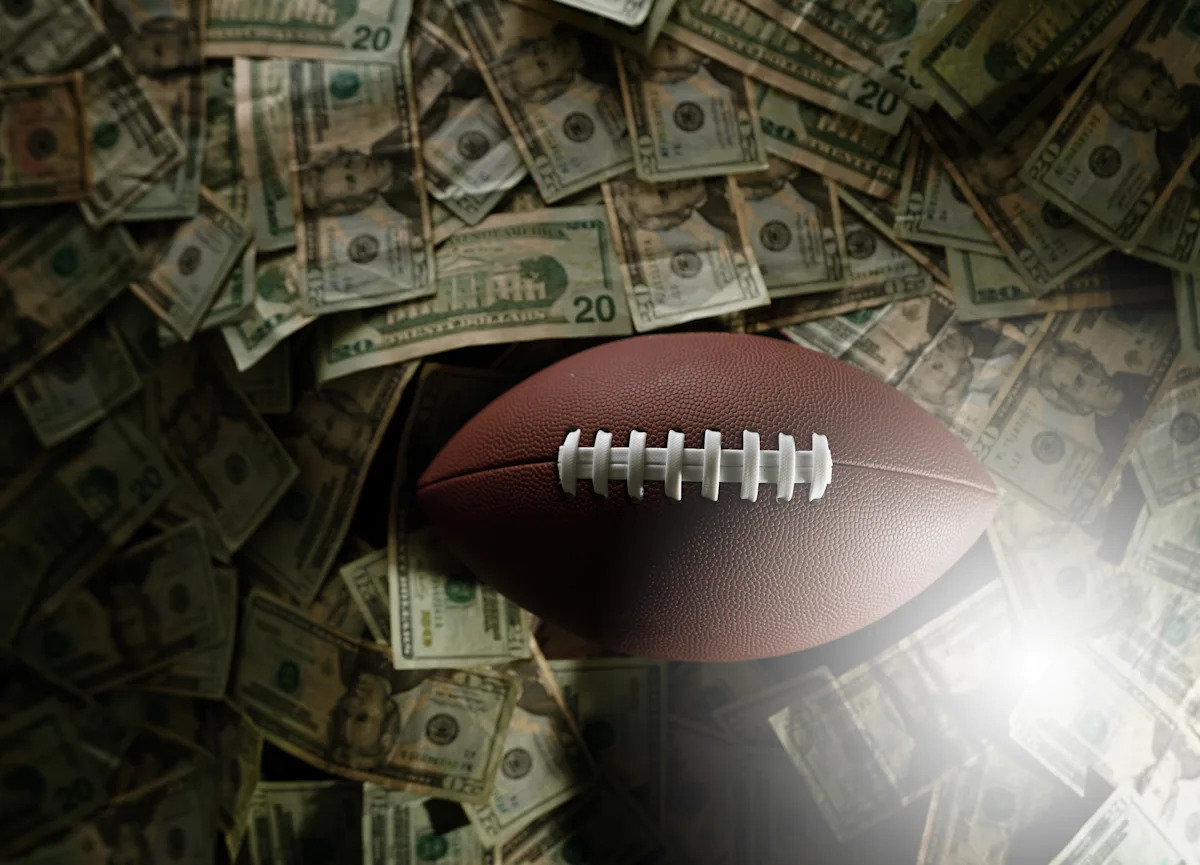
ORLANDO, Fla. — The man steps onto a raised platform, walks behind a podium and leans toward the microphone.
Before him, more than 200 college athletic administrators shift to the front of their seats. For months now, they’ve been waiting for this moment.
Advertisement
“I’m Karl,” the man says, “with Deloitte.”
Karl Schaefer is a young man with perfectly cropped hair, a sharp grin and slender frame. He is here to lead a 40-minute presentation on the single most talked-about concept of college athletics’ new revenue-sharing era: the Deloitte-run clearinghouse dubbed “NIL Go.”
Though it remains unsaid by those in power, the goal of NIL Go is quite clear: prevent booster payments to athletes that, for four years now, have been masquerading as commercial and endorsement deals.
As Schaefer flips through slides of the NIL Go software system, for the first time revealed publicly, whispers within the room build to murmurs. Attendees capture slides with photos. Some video the entire event. Others scribble notes on a pad.
How Deloitte and the new enforcement entity, the College Sports Commission, plan to prevent booster pay is the target of much criticism and fascination — plenty of it shrouded in secrecy for the last many months.
Advertisement
In central Florida, at an annual conference of administrators this week, the shroud was at least partially lifted. Not only was the platform’s interface shown on a giant projection screen during Schaefer’s presentation — including the six-step submission and approval process — but, in interviews with Yahoo Sports or during other public presentations, college sports executives who helped craft the system answered questions that, up to this point, had remained unanswered.
While many doubt that the clearinghouse will withstand inevitable legal challenges, administrators here provided legitimate reasons for why they believe in its long-term survival. Most notable of those, says NCAA president Charlie Baker, is that the clearinghouse’s appeals process — arbitration — is equipped with subpoena powers.
“They do have that power,” Baker told Yahoo Sports this week. “Arbitration typically has subpoena power and I’m pretty sure since this one sits inside an injunction, they will have it.”
Officials at the power conferences confirmed that “significant subpoena powers” exist under the arbitration appeals process, but those powers are less expansive than subpoena authority within a courtroom. The decision to use subpoena powers and how exactly to use them — limited or broad — is expected to rest with the arbitrator presiding over the appeals process.
Advertisement
A subpoena compels individuals or entities to produce evidence under penalty of law, such as turning over text messages, emails and phone call logs as well as testifying before investigators. It is one of the more important tools for officers of the law, such as police investigators — and something that was never available to the NCAA enforcement staff.
“We won’t have complete subpoena power, but if an athlete goes into arbitration … those records, you can get access to some of those records,” said Ohio State athletic director Ross Bjork, who is a member of a settlement implementation committee that helped construct the new enforcement entity.
“It’s going to be a new day.”
The algorithm
Back in the Deloitte presentation room, Schaefer is explaining the submission process for NIL Go. Athletes are required to submit third-party NIL deals of $600 or more using a web-based submission system, not unlike an online registration system for, say, a passport.
Advertisement
Shaefer explains, gesturing toward a giant projection screen, that the clearinghouse makes three determinations once a deal is submitted:
-
Is the third party an “associated entity” with the university, such as a booster, or a business contracted with a school like a university sponsor or apparel brand? If so, more intense scrutiny is applied in the vetting process. Public companies can, and many of them will, be deemed as associated entities.
-
Is the deal for a “valid business purpose?” The third-party business, brand or individual must be receiving true value from the activities, such as an autograph session, television commercial or speaking engagement.
-
Is the deal within Deloitte’s “range of compensation” paid to similarly situated individuals? This is perhaps the most criticized of the concepts. Deloitte created “the range of compensation” through an algorithm using fair market value analysis, comparing similar types of NIL deals struck between an athlete and the third party.
More is now known about that algorithm.
Clemson athletic director Graham Neff, one of the implementation committee members, details the factors used to form a compensation range: “Athletic performance is a big part of it. Your social media reach and following. Market — where schools are at. The reach of your school within said market.”
This will vary by school. Neff offers an example. “The reach of Georgia Tech in Atlanta is different than the reach of Georgia State,” he says.
Advertisement
Neff believes that a “majority” of NIL deals will derive from “associated companies,” as school sponsors, multi-media rights partners and individual alumni and boosters work to provide universities with additional compensation so they can exceed the $20.5 million revenue sharing cap that each school is afforded. Third-party NIL compensation that passes the clearinghouse does not count against the cap.
Even those who helped craft the new enforcement entity acknowledge that the system is attempting to do a very difficult thing: bring regulation to an enterprise that has, for four years now, seen little to no regulation or enforcement of athlete compensation.
“There’s some toothpaste back in the tube a little bit given the environment,” Neff said.
For example, Deloitte officials claim that 70% of past deals from booster collectives would have been denied in their algorithm, while 90% of past deals from public companies would have been approved. Deloitte has also shared with officials that about 80% of NIL deals with public companies were valued at less than $10,000 and 99% of those deals were valued at less than $100,000.
Advertisement
These figures suggest that the clearinghouse threatens to significantly curtail the millions of dollars that school-affiliated, booster-backed collectives are distributing to athletes.
“No one is trying to restrict someone’s earning potential, but what we’re trying to say is, ‘What is the real market?’” Bjork says. “Everybody you talk to about the pro market will tell you that NIL deals for pro athletes are really small. In the collective world, we created a false market.”
Denial, approval and arbitration
Displayed on the giant screen before hundreds of athletic administrators is the six-step clearinghouse submission and approval process.
Advertisement
Step 6 lays out the process for a player if his or her deal is denied by the clearinghouse because it either is not struck for a valid business purpose or it does not meet the compensation range.
(1) Revise and resubmit the deal so that the compensation amount falls within the algorithm’s range. For instance, if the clearinghouse deems that a submitted $1 million deal should be $500,000, the athlete can resubmit for $500,000 and the school, if it so chooses, can compensate the athlete for the other $500,000 through its revenue-share pool.
(2) Cancel the deal completely.
(3) Request arbitration as an appeals process.
Advertisement
(4) Accept the rejected deal as is. In this case, the athlete “may face enforcement consequences (e.g., loss of eligibility),” the Deloitte presentation slide reads.
According to settlement terms, attorneys for the plaintiffs (the suing athletes) and defendants (NCAA and power conferences) will work together to select a neutral arbitrator or arbitrators to preside over these cases. Individual arbitration processes are expected to last no more than 45 days.
In an interview last fall, plaintiff lawyer Jeffrey Kessler described the arbitration as a trial-like set of hearings in front of an arbitrator — the new enforcement entity on one side (NCAA and power conferences) and the athlete on the other side.
NCAA president Charlie Baker says the new NIL enforcement process will add accountability to the system, as long as athletes and schools follow the rules. (Photo by Kevin Dietsch/Getty Images)
(Kevin Dietsch via Getty Images)
How an arbitrator rules may “depend on what evidence” each side produces, Kessler said. As Baker and others have noted, that evidence may now be generated through limited subpoena power.
Advertisement
But one lingering question remains: Will an athlete’s school fight alongside him or her in the case? “I expect that if the athlete pursues it, the school will support the athlete and help provide the athlete with counsel to help represent them in that challenge,” Kessler said.
Penalties for NIL violations
Implementation committee members say they are finalizing a “menu” of penalties for those found to commit violations within this new revenue-sharing era, most notably those found to have (1) circumvented the cap with old-fashioned cheating or intentional or accidental miscalculations; and (2) tampered with another college athlete or prospect who is under contract.
Officials decided against using a set penalty matrix as the NCAA currently does (Level I, Level II, etc.). Instead, they are providing the new College Sports Commission CEO, Brian Seeley, with the flexibility to choose penalties from a wide range of options, depending on the individual circumstance.
Advertisement
“Those penalties being worked through are going to be significant and are going to be different than any penalties we’ve had previously,” said new Michigan State athletic director J Batt, a member of the implementation committee.
An example of a new kind of penalty is a reduction in transfers that a school can acquire from the portal, Bjork says. But there are others. A postseason ban remains among the penalties, said Desiree Reed-Francois, the Arizona athletic director and implementation committee member.
There are also stiff fines — multi-million dollars in value — that may be levied against schools, administrators and coaches. Suspensions, for coaches and administrators, are on the penalty menu as well.
“The fines are substantive,” Reed-Francois says.
Advertisement
One penalty is off the table. Administrators say that reducing a school’s revenue-share pool for subsequent years is not permitted. The settlement guarantees that schools are afforded the same revenue share pool.
Pushback
The clearinghouse has made its way to the U.S. Capitol.
During a congressional hearing over college sports on Thursday, Rep. Lori Trahan, a Democrat from Massachusetts, chided college leaders for instituting a new enforcement process that “guarantees people in power always win and the athletes who fuel this multi-billion dollar industry always lose.”
One of the witnesses in that hearing, Ramogi Huma, the executive director of the National College Players Association, chimed in as well, accusing the NCAA and conference leadership as wanting to “shut down boosters’ ability to pay players just to monopolize it” themselves.
Advertisement
College executives reject these notions and consider all of these elements — even the new enforcement process — as protected by a legally binding settlement. The new enforcement entity was not created by committee members in some “backroom,” Bjork says. The implementation committee only provided structure to an enforcement piece that is “codified” within the settlement.
“There are processes here that have been approved by the court and the plaintiffs and the defendants that people are going to be expected to follow,” Baker told Yahoo Sports. “Given so much of what’s been going on in the third-party space hasn’t been accountable or transparent, and has made a lot of people outside of college athletics a lot of money, I can understand why there might be some grumpiness about this.”
Soon, power conference schools — and others opting into the settlement — are expected to sign an affiliation or membership agreement. With this binding document, schools waive their right to sue over enforcement decisions and commit to settlement terms, even if their state laws contradict them.
The agreement — itself the subject of legal concerns, even from some schools — is an indictment on an industry of stakeholders that, for competitive reasons, are constantly scrambling to bend, break and shatter rules to gain even the slightest edge.
Advertisement
Earlier this week in Orlando, members of the implementation committee publicly implored schools to follow rules.
“This has to be a mindset change,” Bjork told the audience. “We see all the reports and naysayers, that ‘we’re going to go back to old-school cheating and all these things and that this is not going to work.’ This has to work.”
“This will work if we make it work,” Reed-Francois said. “We need to shift our mindset and make this work.”
Can it be done? But what if athletes decide not to submit any of their third-party deals at all?
“People will be turning in people,” Reed-Francois said. “There’s a lot more `transparency now.”
Advertisement
Back in the convention hall, Schaefer, from Deloitte, is winding down his presentation. He thanks the crowd before beginning to walk off the stage.
From among the crowd, a few raised hands emerge. Folks have questions.
Others in the audience remind the hand-raisers of something announced before the presentation began: The Deloitte employees are not taking questions.
College Sports
Chris Beard reacts to House settlement decision, his role in changes
College sports officially entered a new era as Judge Claudia Wilken approved the landmark House v. NCAA settlement. Reactions continue to pour in, including from Ole Miss basketball coach Chris Beard. Beard pointed out the way the landscape continues to shift as schools and programs adjust to the changes under the settlement. The revenue-sharing era […]

College sports officially entered a new era as Judge Claudia Wilken approved the landmark House v. NCAA settlement. Reactions continue to pour in, including from Ole Miss basketball coach Chris Beard.
Beard pointed out the way the landscape continues to shift as schools and programs adjust to the changes under the settlement. The revenue-sharing era is on its way as schools get ready to directly share up to $20.5 million with athletes, and roster limits will also change things in a major way.
As for the impact the House v. NCAA settlement will have on college basketball, Beard stressed the need for buy-in from across the country. From there, it comes down to programs putting themselves in the best position to succeed in the new world of college athletics.
“I think the structure has a lot of good ideas, and I think we all want what’s best for college basketball,” Beard told reporters. “I think it’s important as coaches and as players and as fans, as administrators, we all need to believe in it. Once they put it out there that this is the plan, then we’re going to support it 100%. I don’t think anything productive happens when the plan is set and everybody comes up with an opinion now. If you had that opinion, why didn’t you throw it out there on the front end?
“We’re eager to see what this model looks like, and then we’re going to do everything we can do within the rules to continue to elevate the Ole Miss program. I think that’s exactly what we’ve done here.”
Chris Beard: ‘This has been a real team effort’
Chris Beard specifically pointed to the support the Rebels receive from their primary NIL collective, The Grove Collective, as well as administration and fans. He praised the all-hands-on-deck effort now that the settlement’s implementation is underway.
Beard also noted the success of multiple programs at Ole Miss, from softball to baseball to women’s basketball, golf and volleyball. With the settlement’s approval, his role is to now lead success on the court.
“Again, I give the collective, the administration, the foundation and really, all the fans – from the major, major donor to the Ole Miss faithful that supports us on a monthly basis,” Beard said. “This has been a real team effort. I think you think about the success of Ole Miss, not just men’s basketball. Everything that went on. … Everybody is doing really cool stuff around here.
“And I think the common ingredient is the support. The support from our fan base, our donors, the collective. It’s been awesome around here. It never gets old saying thank you every chance I have a chance to speak, thanking everybody that is contributing any way. And our responsibility is to keep this thing going, and that’s what we’re going to do.”
-

 Health1 week ago
Health1 week agoOregon track star wages legal battle against trans athlete policy after medal ceremony protest
-

 Professional Sports1 week ago
Professional Sports1 week ago'I asked Anderson privately'… UFC legend retells secret sparring session between Jon Jones …
-
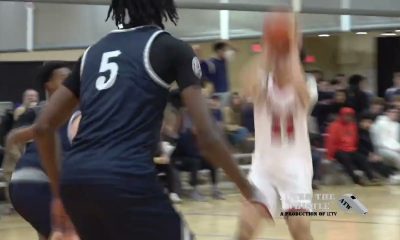
 College Sports2 weeks ago
College Sports2 weeks agoIU basketball recruiting
-

 NIL3 weeks ago
NIL3 weeks ago2025 NCAA Softball Tournament Bracket: Women’s College World Series bracket, schedule set
-

 Professional Sports1 week ago
Professional Sports1 week agoUFC 316 star storms out of Media Day when asked about bitter feud with Rampage Jackson
-
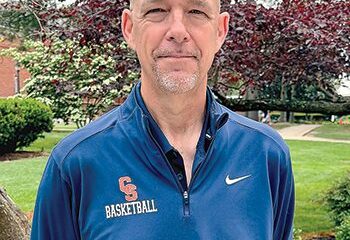
 Rec Sports2 weeks ago
Rec Sports2 weeks agoScott Barker named to lead CCS basketball • SSentinel.com
-
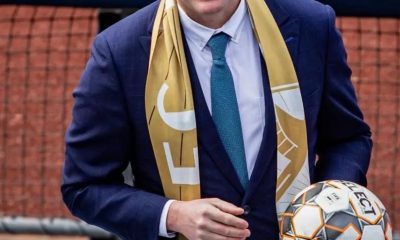
 Rec Sports2 weeks ago
Rec Sports2 weeks agoJ.W. Craft: Investing in Community Through Sports
-

 Motorsports2 weeks ago
Motorsports2 weeks agoNASCAR Penalty Report: Charlotte Motor Speedway (May 2025)
-

 Motorsports2 weeks ago
Motorsports2 weeks agoRockingham Speedway listed for sale after NASCAR return
-

 NIL3 weeks ago
NIL3 weeks agoGreg Sankey: ‘I have people in my room asking, why are we still in the NCAA?’






























